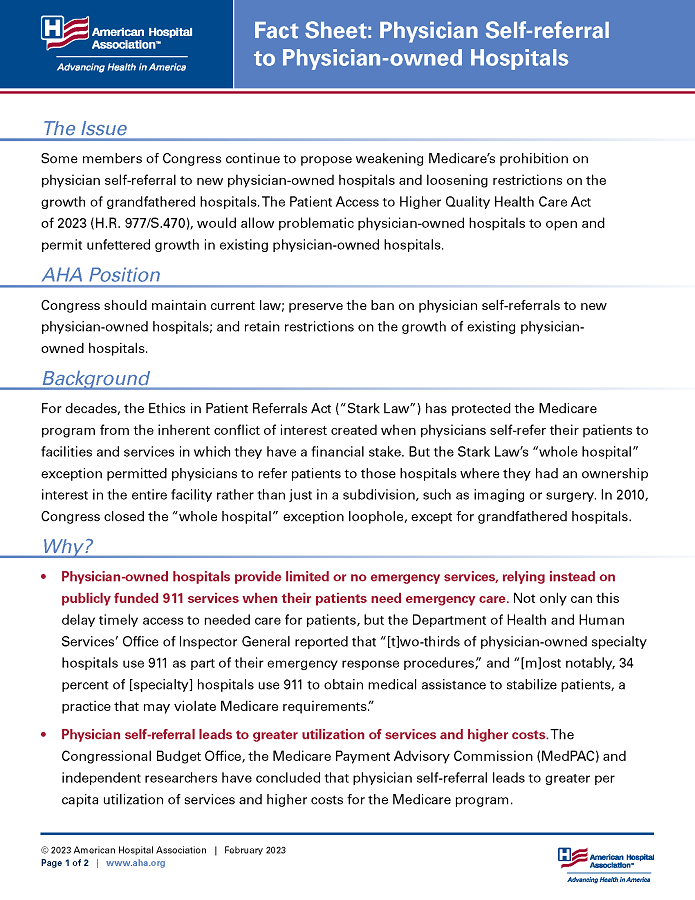

Fact Sheet: Physician Self-referral to Physician-owned Hospitals
The Issue
Some members of Congress continue to propose weakening Medicare’s prohibition on physician self-referral to new physician-owned hospitals and loosening restrictions on the growth of grandfathered hospitals. The Patient Access to Higher Quality Health Care Act of 2023 (H.R. 977/S.470), would allow problematic physician-owned hospitals to open and permit unfettered growth in existing physician-owned hospitals.
AHA Position
Congress should maintain current law; preserve the ban on physician self-referrals to new physician-owned hospitals; and retain restrictions on the growth of existing physician-owned hospitals.
Background
For decades, the Ethics in Patient Referrals Act (“Stark Law”) has protected the Medicare program from the inherent conflict of interest created when physicians self-refer their patients to facilities and services in which they have a financial stake. But the Stark Law’s “whole hospital” exception permitted physicians to refer patients to those hospitals where they had an ownership interest in the entire facility rather than just in a subdivision, such as imaging or surgery. In 2010, Congress closed the “whole hospital” exception loophole, except for grandfathered hospitals.
Why?
- Physician-owned hospitals provide limited or no emergency services, relying instead on publicly funded 911 services when their patients need emergency care. Not only can this delay timely access to needed care for patients, but the Department of Health and Human Services’ Office of Inspector General reported that “[t]wo-thirds of physician-owned specialty hospitals use 911 as part of their emergency response procedures,” and “[m]ost notably, 34 percent of [specialty] hospitals use 911 to obtain medical assistance to stabilize patients, a practice that may violate Medicare requirements.”
- Physician self-referral leads to greater utilization of services and higher costs. The Congressional Budget Office, the Medicare Payment Advisory Commission (MedPAC) and independent researchers have concluded that physician self-referral leads to greater per capita utilization of services and higher costs for the Medicare program.
- Physician-owned hospitals tend to cherry-pick the most profitable patients, jeopardizing communities’ access to full-service care. The Government Accountability Office (GAO), the Centers for Medicare & Medicaid Services and MedPAC all found that physician-owned hospitals’ patients tend to be healthier than patients with the same diagnoses at general hospitals. Further, MedPAC and GAO found that physician-owned hospitals treat fewer Medicaid patients. This trend creates a destabilizing environment that leaves sicker and less-affluent patients to community hospitals, threatening the health care safety net.
- Closing the “whole hospital” exception loophole to the Stark law reduced the federal deficit by $500 million over 10 years, according to CBO. The ill-advised Expanding Patients’ Access to Higher Quality Care Act would erase those savings and raise the deficit at a time when our nation is trying to control increases in health care costs.
Key Facts
- In 2010, the Affordable Care Act (ACA) limited the use of the “whole hospital” exception to Stark Law to existing physician-owned hospitals that had a Medicare provider number as of Dec. 31, 2010. Those grandfathered facilities also must comply with disclosure, patient safety, bona fide investment and growth restriction rules.
- The ACA allows exceptions to the growth restrictions when grandfathered hospitals can demonstrate that their communities need additional capacity. For example, if a physician-owned hospital can show that it has an average or higher number of Medicaid inpatient admissions and is located in an area with significant population growth and high bed occupancy rates, it may increase its number of beds.


